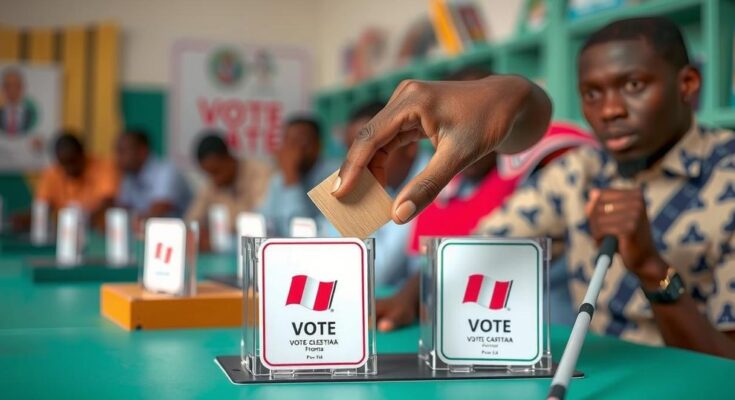Chad is conducting its first parliamentary election in 13 years, framed by the government as a step towards democracy. The opposition is boycotting the polls, claiming the results are predetermined. Initial turnout appears low in the capital, despite higher participation among military and nomadic groups. Allegations of electoral fraud and violence contextualize the voting process, signaling significant political implications for Chad’s future governance.
Voting is currently taking place in Chad for the first parliamentary election in thirteen years, a process the government claims is vital towards restoring democratic governance after years of military rule. Voters are expected to select representatives for a new parliament as well as provincial and local councils in this impoverished nation where opposition parties have called for a boycott, contesting the legitimacy of the electoral process. Initial reports indicate low turnout rates in the capital, N’Djamena, attributed to disinterest and unfavored weather conditions.
The ruling party, aligned with President Mahamat Idriss Deby Itno, who ascended to power following military leadership in 2021, appears poised to benefit from the opposition’s boycott. Officials have reported high turnout among military personnel and nomadic communities voting a day early, with claims of over 72 percent participation from the army. However, opposition leaders contend that the election results were predetermined, with Succes Masra of the Transformers party asserting, “The fabricated results are already in the computers.”, asserting the need for public outcry against electoral fraud.
Today’s voting occurs amid ongoing instability, including threats from the Boko Haram insurgency and issues stemming from climate change, which have exacerbated existing tensions among local communities. The election’s outcome is viewed as pivotal in shaping Chad’s future. Despite the pre-election challenges and allegations of irregularities—including the disappearance of ballots—the government maintains that these elections mark the progression towards a democratic transition.
Chad has not held a parliamentary election in over a decade, with the last being marred by allegations of repression and fraud. President Deby’s ascendance to power was following his father’s lengthy rule that lasted three decades before his death in April 2021. The current electoral process is being framed by the transitional government as a necessary step towards re-establishing democracy in the face of widespread political dissent and societal challenges, including economic hardships and threats from insurgent groups. Opposition parties remain skeptical of the process’s integrity, emphasizing the need for true representation and reforms in government.
Chad’s parliamentary elections signal a critical juncture for its political future, as voters engage in a process fraught with controversy and the possibility of fraud. The opposition’s boycott reflects deep-seated concerns regarding the legitimacy of the electoral process, while the government touts this election as a significant step toward a democratic transition. Nonetheless, the backdrop of violence and socioeconomic strife complicates the electoral landscape, raising questions about the efficacy of governance and representation in Chad during this pivotal moment.
Original Source: www.aljazeera.com




